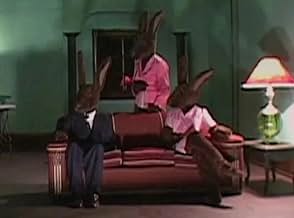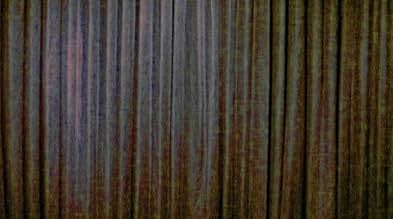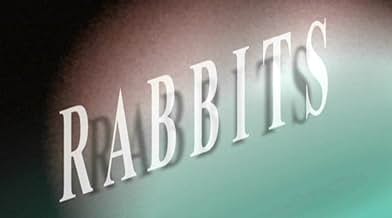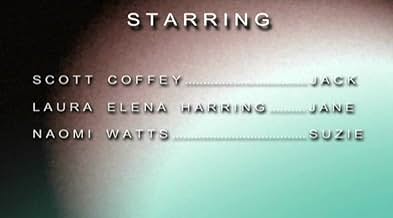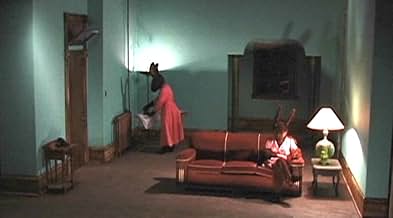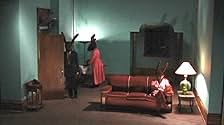Rabbits
- 2002
- 43m
IMDb RATING
6.9/10
8.8K
YOUR RATING
In a nameless city deluged by continuous rain, three rabbits live with a fearful mystery.In a nameless city deluged by continuous rain, three rabbits live with a fearful mystery.In a nameless city deluged by continuous rain, three rabbits live with a fearful mystery.
- Director
- Writer
- All cast & crew
- Production, box office & more at IMDbPro
Featured reviews
Okay, I have been watching David Lynch's work since Twin Peaks. I have seen everything he has done from Eraserhead to Mulholland Dr. It's taken me 3 years to find a copy of RABBITS to watch and I must say... Lynch never ceases to confuse me.
I understand why some people think Lynch is overly self-indulgent, but I don't think that is a reason to hate him and his work. Lost Highway and Mulholland Dr. are two of the greatest film ever, but they are not for everybody.
RABBITS is different than his films, and I am not going to act like I understand RABBITS or pretend that I found my own interpretation to the series. I don't know what I've just seen, I can't even tell you if it was self-indulgent crap or a work of genius, all I can say is if you like Lynch and want to see something different than anything you'll ever see anywhere else, than enjoy:)
I understand why some people think Lynch is overly self-indulgent, but I don't think that is a reason to hate him and his work. Lost Highway and Mulholland Dr. are two of the greatest film ever, but they are not for everybody.
RABBITS is different than his films, and I am not going to act like I understand RABBITS or pretend that I found my own interpretation to the series. I don't know what I've just seen, I can't even tell you if it was self-indulgent crap or a work of genius, all I can say is if you like Lynch and want to see something different than anything you'll ever see anywhere else, than enjoy:)
Here, we get a David Lynch-ized sitcom set and our three characters, dressed in Rabbit suits. The "mystery" is knawing at these characters although what they say is often incomprehensable. On top of this, the piece is supported with a laugh track. I know what you're thinking. It's an absurdist film, right? No.
I don't know how they did it with these elements that would seem laughable from afar, but you know what? You turn off the lights in your room and you watch all eight parts to this, and you'll have nightmares for a week. David Lynch can make anything terrifying. A complete surprise in mood. You won't forget it.
I don't know how they did it with these elements that would seem laughable from afar, but you know what? You turn off the lights in your room and you watch all eight parts to this, and you'll have nightmares for a week. David Lynch can make anything terrifying. A complete surprise in mood. You won't forget it.
This is one of the more bizarre films featuring humans in fluffy bunny suits.
David Lynch juxtaposes Sartrean existentialism and American sitcom with an eerie, industrial-noir soundtrack to create a compelling, hellish universe like only he can.
Also, this is maybe one of the greatest uses of bunnies in storytelling, since Lewis Carroll (with the exception of Hugh Hefner).
With the recent influx of rabbit suits in other indie films, like Gummo and Donnie Darko, one can only expect this trend to grow and explode on the catwalks of Milan and Paris.
David Lynch juxtaposes Sartrean existentialism and American sitcom with an eerie, industrial-noir soundtrack to create a compelling, hellish universe like only he can.
Also, this is maybe one of the greatest uses of bunnies in storytelling, since Lewis Carroll (with the exception of Hugh Hefner).
With the recent influx of rabbit suits in other indie films, like Gummo and Donnie Darko, one can only expect this trend to grow and explode on the catwalks of Milan and Paris.
Everyone who has seen David Lynch's Inland Empire will be familiar with the rabbits of this short film (screened in some places broken down into episodes). Personally I struggled to work out if Inland Empire was brilliant or rubbish and ultimately I concluded that it was both but that it was worth seeing because of what an unnerving and unusual experience it was. The rabbit snippets are all part of it as they meant very little to be but yet managed to actually make me feel uncomfortable and uneasy while watching them. As a result I decided to check out the full Rabbits film.
In an interviewer about Lynch's website project, someone did describe Rabbits as one for the hard-core Lynch fans and this description is bang on the money because it does deliver everything that he does well while also failing (or rather, not trying) to deliver in other, usual areas. Where the snippets hit home for me is in their sheer menacing stiffness. "Normal" things such as the apartment and the idea of a sitcom are all presented in a twisted and perverted way that Lynch viewers will be used to. Just like in Twin Peaks (where backwards characters talk in a red velvet room) the movement is strange, the lighting is eerie, the dialogue is confusing and the whole thing is delivered under a brooding score that suggests an impending destruction or evil.
In this regard the film is quite brilliant and it is very disturbing to watch it in a dark room n a quiet night. But this is also the problem with the film because there is nothing more to it and ultimately the novelty value of it wears off long before the 45 minute mark. After a while I did want more but the film just continued to deliver what it had done at the very start. Die-hard fans of Lynch will love it and take pleasure in trying to pick the meaning out of it but for me it was more a matter of hanging on until the conclusion. It is a shame because in small sections Rabbits is really well done and fascinating. Lynch's creativity is powerful and works across the board many have neglected to mention the physical actors in the film (not the famous voices) but their work is important, with a stillness and deliberate movements being key in the delivery.
Overall then a very strong film for those that love Lynch's creepy work but it is hard to ignore the fact that the running time is too long to sustain the long pauses and very slow pace. As a result it never works as well as it does in its limited use within Inland Empire. Fans should still watch it for what it does well but for the majority of viewers the running time will be far too long and boredom may take away from the uneasy and creepy delivery.
In an interviewer about Lynch's website project, someone did describe Rabbits as one for the hard-core Lynch fans and this description is bang on the money because it does deliver everything that he does well while also failing (or rather, not trying) to deliver in other, usual areas. Where the snippets hit home for me is in their sheer menacing stiffness. "Normal" things such as the apartment and the idea of a sitcom are all presented in a twisted and perverted way that Lynch viewers will be used to. Just like in Twin Peaks (where backwards characters talk in a red velvet room) the movement is strange, the lighting is eerie, the dialogue is confusing and the whole thing is delivered under a brooding score that suggests an impending destruction or evil.
In this regard the film is quite brilliant and it is very disturbing to watch it in a dark room n a quiet night. But this is also the problem with the film because there is nothing more to it and ultimately the novelty value of it wears off long before the 45 minute mark. After a while I did want more but the film just continued to deliver what it had done at the very start. Die-hard fans of Lynch will love it and take pleasure in trying to pick the meaning out of it but for me it was more a matter of hanging on until the conclusion. It is a shame because in small sections Rabbits is really well done and fascinating. Lynch's creativity is powerful and works across the board many have neglected to mention the physical actors in the film (not the famous voices) but their work is important, with a stillness and deliberate movements being key in the delivery.
Overall then a very strong film for those that love Lynch's creepy work but it is hard to ignore the fact that the running time is too long to sustain the long pauses and very slow pace. As a result it never works as well as it does in its limited use within Inland Empire. Fans should still watch it for what it does well but for the majority of viewers the running time will be far too long and boredom may take away from the uneasy and creepy delivery.
Lynch really elevated my opinion of him here. This is very, very well constructed. It is the highest art.
That means that any "explanation" will be worthless. You can read some other material to discover something of what you will see.
Its unsettling and strange, hypnotic and lyrical. That it is in several "episodes" is all a part of how certain familiar forms are subverted to give us something that has identity and also has a sort of meta-identity defined by deviance from the expected.
My observation will be highly personal. I see this as a sort of "Rosencrantz and Guildenstern" but instead of referencing "Hamlet" engages "Alice in Wonderland." It fits, especially if you are inclined as I am to blow Alice into something as world-swallowing as Hamlet. Where Hamlet is all about what it means to sit in the world, Alice works at more refined level, being all about what it means to carry a name in the world.
One is about being and the other about what we see and acknowledge about being. Its this second conceptual space that Lynch inhabits, always has. His "firewalking" TeeVee stuff bends notions of representation and discovery, the amusement being not in what we see, but in the difference between what we expect to see.
Let's look at the entire vocabulary he has toyed with. First, he acknowledges the audience (laugh track), camera (static but in and out of focus), narrative (drawn more overtly by its fragmentation), framing (with very formal, abstract composition) and "acting," which here consists more of pauses and empty spaces than anything we normally associate with acting.
And then there's the bending of the form. We have a demon that appears twice. Its noir drawn tightly, especially since there is a hint that the demon or his avatar as perhaps a "lost dog" is driving the entire situation.
And then we have three "performances," one each by the three characters. These are accompanied by an ignited set, literally ignited. The performances, which each occupy an episode, are pretty transcendent in terms of what we would see in an ordinary drama. In such a case, each would "solo" in such a way that their soul was revealed. Its the challenge of the writer to weave this into events in such a way that we don't see the performer revealing his character overtly. This is different; all pretense is removed. The character enters and opens its heart with no narrative baggage. What the character tells us actually has more information about context than the surrounding context provides.
Ted's Evaluation -- 3 of 3: Worth watching.
That means that any "explanation" will be worthless. You can read some other material to discover something of what you will see.
Its unsettling and strange, hypnotic and lyrical. That it is in several "episodes" is all a part of how certain familiar forms are subverted to give us something that has identity and also has a sort of meta-identity defined by deviance from the expected.
My observation will be highly personal. I see this as a sort of "Rosencrantz and Guildenstern" but instead of referencing "Hamlet" engages "Alice in Wonderland." It fits, especially if you are inclined as I am to blow Alice into something as world-swallowing as Hamlet. Where Hamlet is all about what it means to sit in the world, Alice works at more refined level, being all about what it means to carry a name in the world.
One is about being and the other about what we see and acknowledge about being. Its this second conceptual space that Lynch inhabits, always has. His "firewalking" TeeVee stuff bends notions of representation and discovery, the amusement being not in what we see, but in the difference between what we expect to see.
Let's look at the entire vocabulary he has toyed with. First, he acknowledges the audience (laugh track), camera (static but in and out of focus), narrative (drawn more overtly by its fragmentation), framing (with very formal, abstract composition) and "acting," which here consists more of pauses and empty spaces than anything we normally associate with acting.
And then there's the bending of the form. We have a demon that appears twice. Its noir drawn tightly, especially since there is a hint that the demon or his avatar as perhaps a "lost dog" is driving the entire situation.
And then we have three "performances," one each by the three characters. These are accompanied by an ignited set, literally ignited. The performances, which each occupy an episode, are pretty transcendent in terms of what we would see in an ordinary drama. In such a case, each would "solo" in such a way that their soul was revealed. Its the challenge of the writer to weave this into events in such a way that we don't see the performer revealing his character overtly. This is different; all pretense is removed. The character enters and opens its heart with no narrative baggage. What the character tells us actually has more information about context than the surrounding context provides.
Ted's Evaluation -- 3 of 3: Worth watching.
Did you know
- TriviaDescribed by Lynch as a 9 episode sitcom.
- ConnectionsFeatured in Inland Empire (2006)
Details
- Runtime43 minutes
- Color
- Aspect ratio
- 1.78 : 1
Contribute to this page
Suggest an edit or add missing content


